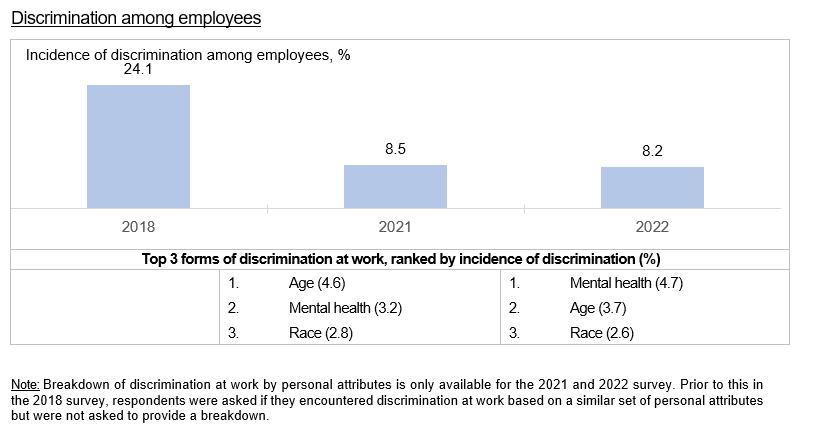Overall Improvements in Workplace Fairness Standards
Overview
1. Fewer Singapore residents in the labour force experienced discrimination at the workplace (2022: 8.2%; 2021: 8.5%) and during their job search (2022: 23.8%; 2021: 25.8%). The continued improvement follows efforts by MOM, TAFEP and tripartite partners to promote fair employment practices.
2. The findings from the “Fair Employment Practices” report released by the Manpower Research and Statistics Department, Ministry of Manpower, are summarised below.
Main Findings
Fewer job seekers and employees faced discrimination during job search and at work
3. The proportion of job seekers who experienced discrimination during their job search fell for the second consecutive year to 23.8% in 2022, from 25.8% in 2021 and 42.7% in 2018.
4. Age (16.6%), race (7.1%) and mental health (5.0%) discrimination were the more common forms of discrimination during job search in 2022.

5. The proportion of employees who experienced discrimination at work continued to decline to 8.2% in 2022, from 8.5% in 2021. This proportion was significantly lower than 24.1% in 2018.
6. In 2022, mental health (4.7%), age (3.7%), and race (2.6%) discrimination were also the more common forms of discrimination at work.
More employees who faced discrimination sought help
7. The proportion of employees who sought help upon facing discrimination at work nearly doubled to 35.3% in 2022 from 20.0% in 2021. More employees also reported that their firms had put in place formal procedures to manage workplace discrimination in 2022 (59.8%), up from 54.0% in 2021.
8. This is a good development and could lead to further improvements in workplace fairness in the future. Analysis of the survey results suggest that the presence of formal procedures to manage workplace discrimination reduced the likelihood of age, race, sex, maternal and marital status discrimination.
Conclusion
9. The further improvement in workplace discrimination from 2018 to 2022 follows the collective tripartite efforts to promote and sustain fair employment practices. However, job seekers and employees who still experienced discrimination should seek help through their employers’ grievance handling process and may also approach TAFEP for assistance. Enacting the Workplace Fairness Legislation will further strengthen our stand against workplace discrimination in Singapore and ensure access to fair opportunities for our workers.
For More Information
10. The “Fair Employment Practices” report is released by the Manpower Research and Statistics Department, Ministry of Manpower. The report draws on data from the Survey on Fair Employment Practices. The 2022 survey covered 3,600 Singapore residents (i.e. Singapore citizens and permanent residents) in the labour force aged 15 and over, of whom 80.3% responded. To ensure that our survey results can be generalised to the entire resident workforce, the sample is selected randomly and is representative of the profile of Singapore’s resident workforce such as age, sex, and labour force status. Respondents were asked to recount their experiences in the year prior to the time the survey was conducted. The survey methodology is kept consistent to enable comparisons of results across the years. The report is available at http://stats.mom.gov.sg/Pages/Home.aspx.